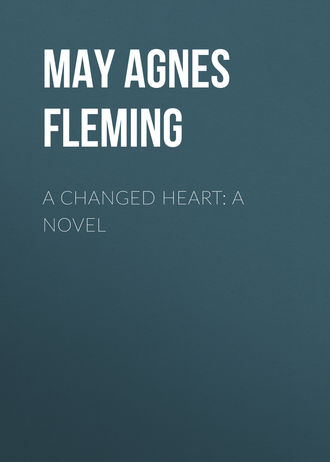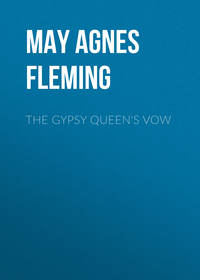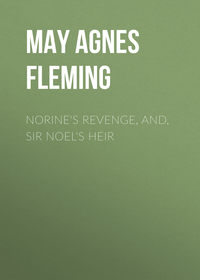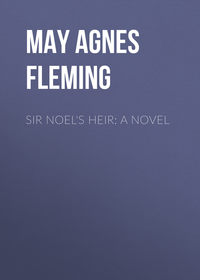 полная версия
полная версияA Changed Heart: A Novel
"Cherrie comes out to show herself every afternoon," explained Alick; "you don't know her, Captain Cavendish, do you?"
"I have seen her before, I think. A very pretty girl."
"Charley thinks so – don't you, old fellow? Half the young men in the town are looney about her."
"I must make her acquaintance, then," said Captain Cavendish, running up the hotel steps. "The girl that all are praising is just the girl for me. This way, gentlemen."
While the triad sat over their dinner and dessert, Miss Nettleby did her shopping – that is, she chatted with the good-looking clerks over the counter, and swept past the old and ugly ones in silent contempt. Cherrie was in no hurry; she had made up her mind before starting to go through every drygoods store in Speckport, and kept her word. It was growing dusk when the dress was finally bought, cut off, and paid for – a bright pink ground, with a brighter pink sprig running through it.
"Shall we send it, Miss Nettleby?" insinuated the gentlemanly clerk, tying it up with his most fascinating smile.
"Of course," said Cherrie, shaking out her skirts with an air; "Mr. Nettleby's, Redmon Road. Good evening, Mr. Johnston."
Cherrie was soliloquizing as she gained the street.
"Now, I do wonder if he'll be home. They have tea at six, I know, and it's only a quarter to six, now. I can say I want a book, and he'll be sure to come home with me. I must see that new teacher."
Walking very fast Cherrie reached Cottage Street as the clocks of Speckport were chiming six, and the laborers' bells ringing their dismissal. Catty Clowrie was standing in her own doorway, but Cherrie did not stop to speak, only nodded, and knocked at Mrs. Marsh's door. Betsy Ann opened it and Cherrie walked into the sitting-room, where a fire burned, warm as the afternoon had been, and Mrs. Marsh, with a shawl about her and a novel in her hand, swayed to and fro in her rocking-chair. Miss Rose in the parlor was trying her new piano, which Natty had ordered that morning, and which had just come home.
"Dear me!" said Mrs. Marsh, looking up from the book and holding out her hand, "is it you, Cherrie? How do you do? Sit down."
Cherrie did so.
"I've been out all the afternoon shopping for Miss Natty, and I thought I would call here before I went home to ask you for another book. That last one was real nice."
"Of course. What were you buying for Natty?"
"Oh, it was only a calico dress for Midge; it's being sent up. Mrs. Marsh, who's that playing the piano?"
"That's Miss Rose, Natty's teacher. Have you seen her yet?"
"No. How nice she plays. Don't she?"
"She plays very well. And so you liked that last book – what's this it was – 'Regina,' wasn't it?"
"Yes," said Cherrie; "and oh, it was lovely. That earl was so nice, and I liked Regina, too. What's that you're reading?"
"This is 'Queechy' – a very good story. Did you ever read 'The Lamplighter?' I'll lend you that."
"Thank you, ma'am," said Cherrie. "It's getting late. I suppose I must go."
"Stay for tea," said Mrs. Marsh, who liked Cherrie; "it's all ready, and we are only waiting for Charley. I don't see where he's gone too; he wasn't home to dinner, either."
"I saw him this afternoon," said Cherrie; "him and young McGregor and Captain Cavendish were going up Queen Street."
"Was he? Perhaps they had dinner together there. How did you know Captain Cavendish, Cherrie?"
"I saw him at Redmon. He was up all yesterday forenoon. I guess he is after Miss Natty."
Mrs. Marsh smiled and settled her cap.
"Oh, I don't know. Take off your things, Cherrie, and stay for tea. It's of no use waiting for Charley. Betsy Ann, bring us the teapot, and call Miss Rose."
Cherrie laid aside her turban and lace, and was duly made acquainted with Miss Rose. Cherrie had heard the new teacher was pretty, but she had hoped she was not so very pretty as this, and a pang of jealousy went through her vain little heart. She had stayed for tea, hoping Charley would partake of that repast with them, and afterward escort her home; but it commenced and was over, but that young gentleman did not appear.
Miss Rose played after tea, and Cherrie lingered and lingered, under pretense of being charmed; but it got dark, and still that provoking Charley did not come. Cherrie could wait no longer, and a little cross and a good deal disappointed, she arose to go.
"You will perish in that lace mantle," said Miss Rose, kindly. "You had better wear my shawl; these spring nights are chilly."
Cherrie accepted the offer, rolled her lace up in a copy of the "Speckport Spouter," and started on her homeward journey. The street lamps were lit, the shop windows ablaze with illumination, and the cold, keen stars were cleaving sharp and chill through the blue concave above. A pale young crescent moon shone serene in their midst, but it might have been an old oil-lamp for all Miss Nettleby cared, in her present irate and vexed frame of mind. But there was balm in Gilead; a step was behind her, a man's step, firm and quick; a tall form was making rapid head-way in her direction. Cherrie looked behind, half frightened, but there was no mistaking that commanding presence, that military stride, in the handsome face with the thick black mustache, looking down upon her. Cherrie's heart was bounding, but how was he to know that.
"I knew it was you, Cherrie," he said, familiarly. "Are you not afraid to take so long and lonely a walk at this hour?"
"I couldn't help it," said Cherrie, all her good humor returning. "There was no one to come with me. I was down at Mrs. Marsh's, and Charley wasn't home."
"I don't want you to go to Mrs. Marsh's, and I am glad Charley wasn't home."
"I didn't go to see Charley," said Cherrie, coquettishly. "I wanted a book, and I wanted to see Miss Rose. Do you know where Charley is?"
"He is up at Redmon."
"And you are going there, too, I suppose."
"I am going to see you home, just now. Let me carry that parcel, Cherrie, and don't walk so fast. There's no hurry, now that I am with you. Cherrie, you looked like an angel this afternoon, in Queen Street."
As we do not generally picture angelic beings in shot silks and blue parasols, not to speak of turban hats, it is to be presumed Captain Cavendish's ideas on the subject must have been somewhat vague. Cherrie obeyed his injunction not to hurry, and it was an hour before they reached the cottage.
Captain Cavendish declined going in, but stood in the shadow of the trees, opposite the house, tattling to her for another half hour, then shook hands, and went to Lady Leroy's, where he and Charley and Mr. Blake were to spend the evening.
Val and Charley were there before him, the former having but just entered. The captain had not seen Val, but Val had seen the captain, and watched him now with a comical look, playing the devoted to Nathalie.
In Mrs. Leroy's mansion there was no lack of rooms – Natty had two to herself – sleeping-room adjoining the old lady's, and a parlor adjoining that. It was in this parlor Natty received her own friends and visitors, and there the three gentlemen were now. Natty's rooms were the only light and cheerful ones in the vast, gloomy old house, and Natty had fitted them up at her own expense. Delicate paper on the walls; pretty drawings and landscapes, in water-colors, the work of her own artistic fingers, hung around; a lounge, cushioned in chintz; an arm-chair, cushioned in the same; attractive trifles of all sorts, books, a work-table, and an old piano – made the apartment quite pleasant and home-like. The only thing it wanted was a fire; for it was essentially a bleak house, full of draughts – but a fire in any room save her own was a piece of extravagance Lady Leroy would not hear of. So the gentlemen sat in their overcoats; and Lady Leroy, who had been wheeled in, in her arm-chair, looked more like an Egyptian mummy than ever.
Midge sat behind her, on her hunkers, if you know what that is; her elbows on her knees, her chin between her hands, glaring balefully on Captain Cavendish, making himself fascinating to her young mistress. If that gallant young officer had ever heard the legend of the Evil Eye, he might have thought of it then, with Midge's malignant regards upon him.
Lady Leroy, who dearly loved gossip, was chattering like a superannuated magpie to Val and Charley. Mr. Blake was giving her what he knew of the captain's history.
"His uncle," said Val, "is a baronet – a Yorkshire baronet at that – and Captain Cavendish is next heir to the title. Meantime, he has nothing but his pay, which would be enough for any reasonable man, but isn't a tithe to him."
"And he wants a rich wife," said Lady Leroy, with a spiteful glance over at him. "Ah! I see what he's coming after. Natty!"
"Ma'am!" said Natty, looking up, and still laughing at some anecdote Captain Cavendish had been relating.
"What are you laughing at?" she said, sharply.
"Only at a story I have been listening to! Do you want anything?"
"Yes. Go into my room and see what time it is."
"We bring Time with us," said Mr. Blake, producing a watch as big as a small football; "it's five minutes to nine."
"Then it's my bedtime! Natty, go and make me my punch. Midge, wheel me in, and warm the bed. Young men, it's time for you to go."
Captain Cavendish and Val exchanged an amused glance and arose. Charley stepped forward and laid his hand on the arm-chair.
"I'll wheel you in, Mrs. Leroy. Stand clear, Midge, or the train will run into you. Go ahead, fellows, I'll be after you."
"You must not mind Mrs. Leroy's eccentricities, you know," said Natty, shaking hands shyly and wistfully at the front door with the captain. "Mr. Blake is quite used to it, and thinks nothing of it."
"Think better of me, Miss Marsh. I do not mind her brusqueness any more than he does; in proof whereof I shall speedily pay my respects at Redmon again. Good night!"
"Tell Charley to overtake us. Good night, Natty!" called Val, striding down the moon-lit avenue, and out into the road.
Captain Cavendish lit a cigar, handed another to his companion, took his arm and walked along, thinking. The Nettleby cottage was in a state of illumination, as they passed it; and the shrieks of an accordion, atrociously played, and somebody singing a totally different air, and shouts of laughter, mingling together, came noisily to their listening ears. Val nodded toward it.
"Cherrie holds a levee every night – the house is full now. Will you come in? 'All the more the merrier,' is the motto there."
"No," said the captain, shrinking fastidiously; "I have no fancy for making one in Miss Cherrie's menagerie."
"Does the objection extend to Miss Cherrie herself?" asked Mr. Blake, puffing energetically.
"What do I know of Miss Cherrie?"
"Can't say, only I should suppose you found out something while seeing her home an hour ago, and standing making love to her under the trees afterward."
Captain Cavendish took out his cigar and looked at him.
"Where were you?"
"Coming through the rye – I mean the fields. The next time you try it on, take a more secluded spot, my dear fellow, than the queen's highroad!"
"Oh, hang it!" exclaimed the young officer, impatiently; "it seems to me, Blake, you see more than you have any business to do. Suppose I did talk to the little girl. I met her on the road alone. Could I do less than escort her home?"
"Look here," said Val, "there is an old saying, 'If you have too many irons in the fire, some of them must cool.' Now, that's your case exactly. You have too many irons in the fire."
"I don't understand."
"Don't you? Here it is, then! This morning, bright and early, I saw you promenading the shore with Miss Rose. This evening, I saw you making up to Cherrie Nettleby; and, ten minutes ago, you were as sweet as sugar-candy on Natty Marsh. No man can be in love with three women at once, without getting into trouble. Therefore, take a friend's advice, and drop two of them."
"Which two?"
"That's your affair. Please yourself."
"Precisely what I mean to do; and now, Val, old boy, keep your own counsel; there's no harm done, and there will be none. A man cannot help being polite to a pretty girl – it's nature, you know; and, dear old fellow, don't see so much, if you can help it. It is rather annoying, and will do neither of us any good."
Perhaps Captain Cavendish would have been still more annoyed had he known Val was not the only witness of that little flirtation with Cherrie. As that young lady, when he left her, after watching him out of sight, was about crossing the road to go into the house, a voice suddenly called, "Hallo, Cherrie! How are you?"
Cherrie looked up greatly astonished, for the voice came from above her head. Was it the voice of a spirit? – if so, the spirit must have a shocking bad cold in the head, and inclined to over-familiarity at that. The voice came again, and still from above.
"I say, Cherrie! You put in a pretty long stretch of courting that time! I like to see you cutting out the rest of the Speckport girls, and getting that military swell all to yourself."
Cherrie beheld the speaker at last; and a very substantial spirit he was, perched up on a very high branch of a tree, his legs dangling about in the atmosphere, and his hands stuck in his trowsers.
"Lor!" cried Miss Nettleby, quite startled, "if it ain't that Bill Blair! I declare I took it for a ghost!"
Bill kicked his heels about in an ecstasy.
"Oh, crickey! Wasn't it prime! I ain't heard anything like it this month of Sundays. Can't he keep company stunning, Cherrie? I say, Charley's dished, ain't he, Cherrie?"
"How long have you been up there, you young imp?" asked Cherrie, her wrath rising.
"Long enough to hear every word of it! Don't be mad, Cherrie – Oh, no, I never mentions it, its name is never heard – honor bright, you know."
"Oh, if I had you here," cried Miss Nettleby, looking viciously up at him, "wouldn't I box your ears for you!"
"Oh, no, you wouldn't!" said Bill, swinging about. "How was I to know when I roosted up here that you were going to take a whack at courting over there. I was going over to Jim Tod's, and, feeling tired, I got up here to rest. I say, Cherrie? would you like to hear a secret?"
Cherrie would like nothing better, only before he told it, she would rather he got down. It gave her the fidgets to look at him up there. Bill got lazily down accordingly.
"Now, what's the secret?" asked the young lady.
"It's this," replied the young gentleman. "Do you know who Captain Cavendish happens to be?"
"I know he's an Englishman," said Cherrie; "all the officers are that."
"Yes; but you don't know who his folks are, I bet."
"No. Who are they? Very rich, I suppose?"
"Rich!" exclaimed Mr. Blair, contemptuously. "I say, Cherrie, you won't tell, will you? It's a secret."
"Of course not, stupid. Go on."
"Say, 'pon your word and honor."
"'Pon my word! Now go on."
"Well, then," said Bill, in a mysterious whisper, "he's – Queen Victoria's – eldest – son!"
"What!"
"I told you it was a secret, and it is. I heard him telling my boss – Blake, you know, and they didn't think I was listening. Queen Victoria, when she was a young woman, was married secretly to a duke, the Duke of Cavendish, and had one son. When her folks found it out – jimminy! wasn't there a row, and the Duke was beheaded for high treason, and she was married to Prince Albert. Now, you'll never tell, will you, Cherrie?"
"Never!" answered Cherrie, breathlessly. "Well?"
"Well, Captain Cavendish was brought up private, and is the right heir to the throne; and he expects his mother to leave it to him in her will when she dies, instead of the Prince of Wales. Now, if he marries you, Cherrie, and I am pretty sure he will before long – then you are Queen of England at once."
"Now, Billy Blair," said Cherrie, puzzled whether to believe his solemn face or not, "I do believe you're telling lies."
"It's true as preaching, I tell you. Didn't I hear 'em with my own ears. That chap's sure to be King of England some day, and when you're queen, Cherrie, send for Bill Blair to be your prime-minister. And now I must go – good night."
CHAPTER VIII.
VAL TURNS MENTOR
Miss Nathalie Marsh was not the only person in existence who took a violent fancy to the pretty, pale little school-mistress, Miss Rose. Before the end of the month, Speckport pronounced her perfection; though, to do Speckport justice, it was not greatly given to overpraise. Indeed, it was a common saying with the inhabitants that Speckport would find fault with an archangel, did one of these celestial spirits think fit to alight there, and the very person most vehement in this assertion would have been the first in the backbiting. Yet Speckport praised Miss Rose, and said their Johnnys and Marys had never get on so fast in their A B abs, before, and the little ones themselves chanted her praises with all their hearts. If she appeared in the streets, they rushed headlong to meet her, sure of a smile for their pains. They brought her flowers every morning, and a reproachful look was the severest punishment known in the schoolroom. The old women dropped their courtesies; the old men pronounced her the nicest young woman they had seen for many a day, and the young men – poor things! fell in love.
There was some one else winning golden opinions, but not from all sorts of people. Only from young ladies, who were ready to tear each other's dear little eyes out, if it could have helped the matter: and the man was Captain George Cavendish. Speckport was proud to have him at its parties; for was he not to be a baronet some day? and was his family in England, their Alma Mater, not as old as the hills, and older? But he was an expensive luxury. Their daughters fell in love with him, and their sons spent their money frightfully fast with him; and all sons or daughters got in return were fascinating smiles, courtly bows, and gallant speeches. He was not a marrying man, that was evident; and yet he did seem rather serious with Nathalie Marsh. Miss Marsh was the handsomest girl in Speckport; she would be the richest, and she was for certain the only one that ever had a grandfather – that is, to speak of: in the course of nature they all had, perhaps; but the grandfathers were less than nobody – peddlers, rag-men, and fish-hawkers. But her father and grandfather had been gentlemen born; and it is well to have good blood in one's veins, even on one side. So the young ladies hated Miss Marsh, and were jealous of each other; and that high-stepping young heiress laughed in their face, and walked and talked, and rode and sailed, and sang and danced with Captain Cavendish, and triumphed over them like a princess born.
It was June, and very hot. Speckport was being grilled alive, and the dust flew in choking simooms.
Cool through all the heat, Captain Cavendish walked up Queen Street in the broiling noonday sun. Charley Marsh and Alick McGregor walked on either side of him, like that other day on which they had met Cherrie; and Charley's face was flushed and clouded, and young McGregor's drawn down to a most lugubrious length. They had just come from Prince Street – an every-day resort now; and Charley and McGregor seldom left it of that late without clouded expression. Captain Cavendish was laughing at them both.
"All in the downs!" he cried; "nonsense, Marsh. One would think you were ruined for life."
"I soon shall be at this rate. I owe you a small fortune now."
"Only fifty pounds," said the captain, as carelessly as if it were fifty pence, "a mere trifle."
"And I owe you twice as much," said young McGregor, with a sort of groan; "won't there be the dickens to pay when it's found out at home."
"Don't let them find it out, then," said Captain Cavendish, in the same off-hand manner.
"That's easily said. How am I to help it?"
"Your father has a check-book – help yourself."
"That would be killing the goose that lays the golden eggs," said Charley. "Let the old man find that out and good-bye to Alick's chance of ever seeing Prince Street again. Here are my quarters – no use asking you in to hear the row old Leach will make at my delay, I suppose."
He nodded, with his own careless laugh, and entered the office of Doctor Leach. Captain Cavendish looked at his watch.
"Half-past eleven! I believe I owe your people a call, McGregor; so en avant!"
Miss Jeannette McGregor was at home, and received the captain and her brother in her boudoir, a charming little room, with velvet-pile carpet, gilding, and ormolu, and medallion pictures of celebrated beauties set in the oval paneled walls. A copy of Longfellow, all gold and azure, was in her hand; she had once heard Captain Cavendish express his admiration of the great American poet; and having seen her brother and he coming up the front steps, she had arranged this little tableau expressly for the occasion. If there was one young lady in all Speckport who more than another sincerely hated Nathalie Marsh, or more sincerely admired Captain Cavendish, that one was Miss McGregor. She had long been jealous of Natty's beauty, but now she detested her with an honest earnestness that, I think, only women ever feel. She kissed her whenever they met; she invited her to every party they gave; she made calls at Redmon: and she hated her all the time, and could have seen her laid in her coffin with the greatest pleasure. It is a very common case, my brethren; Judas Iscariot was not a woman, but kisses after his fashion are very popular among the gentler sex.
"Evangeline," said Captain Cavendish, taking up her book; "I always liked that, but never half so well as since I came to Speckport."
"Because you saw Miss Marsh in the character," said Jeannette, laughing, as young ladies must, in these cases.
"Miss Marsh took her character very well, but that is not the only reason why I shall long remember that night."
A glance accompanied this speech that brought a glow to Miss McGregor's cheek and a flutter to her heart. Captain Cavendish was a clever man. He had more irons in the fire than even Val knew of, and allowed none of them to cool; and it does take a clever man to make love discreetly to half-a-dozen women at once.
"Natty looked stunning that night," put in Alick; "she is the handsomest girl in Speckport."
"You think so – we all know that," said Jeannette, flashing a spiteful glance at him; "you have been making a simpleton of yourself about her for the last two years. Why don't you propose at once."
"Because she wouldn't have me," blurted honest Alick; "I wish to heaven she would! I would soon do the popping."
"Faint heart never won fair lady; take courage and try," said the captain.
Jeannette looked at him with her most taking smile.
"Are you quite sincere in that, Captain Cavendish?"
"Quite! Why not?"
"Oh, nothing! Only rumor says you are going to carry a Bluenose bride back to Merrie England."
"Perhaps I may. You are a Bluenose, are you not, Miss Jeannette?"
Before Jeannette could answer, a sort of shout from Alick, who was at the window, took their attention. Miss McGregor looked languidly over.
"Oh, how noisy you are! What is it, pray?"
The door-bell rang loudly.
"It's Natty herself and Laura Blair. You ought to have seen Natty driving up, captain; she handles the ribbons in tiptop style, and that black mare of Blair's is no joke to drive."
Before he had finished speaking, the door opened, and a servant showed in the two young ladies. Miss Jeannette sprang up with the utmost effusion, and kissed each on both cheeks.
"You darling Natty! It is ages since you were here. Laura, how good it is of you to fetch her! for I know it must have been you."
"So it was," said Laura, shaking hands with Captain Cavendish. "I haven't time, I haven't time, is always her cry. I tell her there will be time when we are all dead – won't there, captain?"
"I presume so, unless at the loss of Miss Laura Blair the whole economy of creation blows up with a crash."
"And so you see," said Laura, sitting down on a chair, and flirting out her skirts all around her, "I drove up to Redmon this morning, with a great basketful of English strawberries the size of crab-apples, as a coaxer to Lady Leroy; and through their eloquence, and the promise of another, got her to let Natty come to town with me on business."






